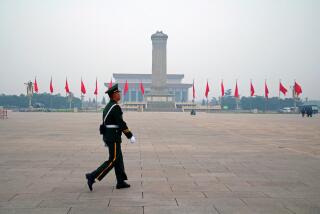China Acting Against Torture, Aide Says : Law enforcement: Top prosecutor says hundreds of cases of possible forced confessions have been investigated.
- Share via
BEIJING — China’s top prosecutor provided a rare glimpse Monday into violations of criminal suspects’ rights, reporting that in the last five years prosecutors have investigated 1,687 cases in which torture may have been used to extract confessions.
The prosecutor, Liu Fuzhi, told the National People’s Congress that officials have also engaged in a wide range of other abuses. Liu heads the Supreme People’s Procuratorate, an office roughly comparable to that of the attorney general in the United States.
“(Prosecutors) at all levels have paid particular attention to cases involving extorting confessions by torture, bending the law for personal gain, infringing upon citizens’ freedom of communication by letters, frame-ups with false accusations and sabotaging elections,” Liu said in an annual report to the Congress.
Liu’s report seemed primarily aimed at presenting the argument that human rights violations are rather isolated and that China is already dealing effectively with them. But it may also have been meant as a genuine warning to lower-level authorities that abuses should be curbed.
“Whenever there is a case of violation of human rights, the (prosecutors) will move quickly to investigate and bring the perpetrators to book,” Liu said. “Some Western countries attack us over the human rights question. This is unreasonable and groundless.”
Liu said investigators looked into “1,687 cases involving extorting confessions by torture committed by the police and judiciary workers.” He gave no details on how many suspected torturers were found guilty or punished.
Western human rights groups have charged that the use of torture, while officially banned by Beijing, is endemic in the Chinese penal system because of a lack of safeguards for prisoners’ rights.
Under China’s legal system, police and prosecutors hold primary power to determine the guilt or innocence of suspects. Defendants are presumed guilty once they are brought before a court, with the primary purpose of trials being to determine sentencing.
Statistics presented to the Congress on Monday by Ren Jianxin, president of the Supreme People’s Court, illustrate how the system works: Of 2.4 million criminal suspects brought before Chinese courts in the last five years, 99.6% were convicted, Ren reported.
Ren said that criminal cases have risen at an average annual rate of 7.9% during the last five years.
“The general security situation is stable now, but in some places the security situation is still not very good, with cases of serious crime continuing to rise,” Ren said. “In a very few places, criminal activity is running wild.”
Economic crime also is a growing problem, Liu said. Since 1988, he said, prosecutors have investigated more than 214,000 cases of embezzlement and bribery, including 50,000 “major cases” involving sums greater than 10,000 yuan--$1,750 at the current exchange rate. Legal proceedings were undertaken against more than 95,000 people in these cases, he said.
In other Congress action, delegates Monday approved a central government restructuring program intended to slash staff levels by 20%. Under the plan, the government’s existing 86 ministries, commissions, organizations and administrative offices will be reduced to a total of 59. This is to be done partly by turning some government agencies into government-owned but highly autonomous corporations, which presumably would continue to employ many former government workers.
More to Read
Sign up for Essential California
The most important California stories and recommendations in your inbox every morning.
You may occasionally receive promotional content from the Los Angeles Times.













